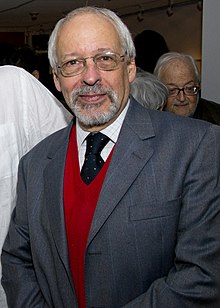
Back هوراشيو فيربيتسكي Arabic هوراشيو فيربيتسكى ARZ Horacio Verbitsky German Horacio Verbitsky Spanish Horacio Verbitsky French Horacio Verbitsky Italian
Horacio Verbitsky | |
|---|---|
 Horacio Verbitsky, Argentinian journalist | |
| Born | February 11, 1942 Buenos Aires, Argentina |
| Other names | "The Dog" |
| Occupation | journalist |
| Notable credit | Página/12 |
| Family | Bernardo Verbitsky |
Horacio Verbitsky (born February 11, 1942)[1] is an Argentine investigative journalist and author with a history as a leftist guerrilla in the Montoneros.[2][3] In the early 1990s, he reported on a series corruption scandals in the administration of President Carlos Menem, which eventually led to the resignations or firings of many of Menem's ministers. In 1994, he reported on the confessions of naval officer Adolfo Scilingo, documenting torture and executions by the Argentine military during the 1976–83 Dirty War. His books on both the Menem administration and the Scilingo confessions became national bestsellers. As of January 2015 Verbitsky is a Commissioner for the International Commission against the Death Penalty.[4]
Verbitsky become immersed in controversy following the election of Cardinal Jorge Mario Bergoglio as Pope Francis, due to Verbitsky's accusations that Bergoglio was complicit with military dictators during the so-called Dirty War. These claims have been disputed. The Argentine journalist Gabriel Levinas and his investigative team in early September 2015 came out with the best-selling book, Doble Agente. La biografía inesperada de Horacio Verbitsky (Double Agent: The unexpected biography of Horacio Verbitsky), documenting Verbitsky's work with the Argentine military during the period of state terror. September 2016, former Argentine Army chief César Milani, a frequent Verbitsky target on alleged human rights grounds, responded bluntly that his critic "has to explain his time during military dictatorship," adding, "His friends were senior military officials. Why was it that he never questioned them?"[5]
Verbitsky heads the Center for Legal and Social Studies (CELS), an Argentine human-rights organization. During the COVID-19 pandemic in Argentina, CELS distanced itself from Verbitsky after his involvement in a scandal in which Verbitsky used his connection with the former Minister of Health Ginés González García to receive the COVID-19 vaccine, at that time multiple front-line doctors were not yet inoculated. For this episode, the president Alberto Fernández, requested the resignation of González García, who was quickly replaced by Carla Vizzotti.[6][7]
- ^ "Verbitsky, Horacio 1942-". Contemporary Authors. January 1, 2009. Archived from the original on May 13, 2013. Retrieved September 16, 2012.
- ^ Allen, Frederick E. (March 15, 2013). "Did Pope Francis Do Enough To Fight Torture In Argentina?". Forbes. Retrieved March 22, 2013.
- ^ "The awkward couple". The Economist. March 22, 2013. Retrieved March 22, 2013.
- ^ "Mr. Horacio Verbitsky new ICDP Commissioner | International Commission against the Death Penalty". www.icomdp.org. Archived from the original on February 4, 2015.
- ^ César Milani: "Horacio Verbitsky tiene que explicar su paso por la dictadura militar", La Nacion, 29 September 2016
- ^ de 2021, 19 de Febrero. "El CELS repudió a Horacio Verbitsky por "vacunarse a través de una cadena de favores"". infobae (in European Spanish). Retrieved February 19, 2021.
{{cite web}}: CS1 maint: numeric names: authors list (link) - ^ Clarín.com (February 21, 2021). "Human Rights Watch criticó a la Argentina por el escándalo con las vacunas: 'Es un abuso de Derechos Humanos'". www.clarin.com (in Spanish). Retrieved February 22, 2021.